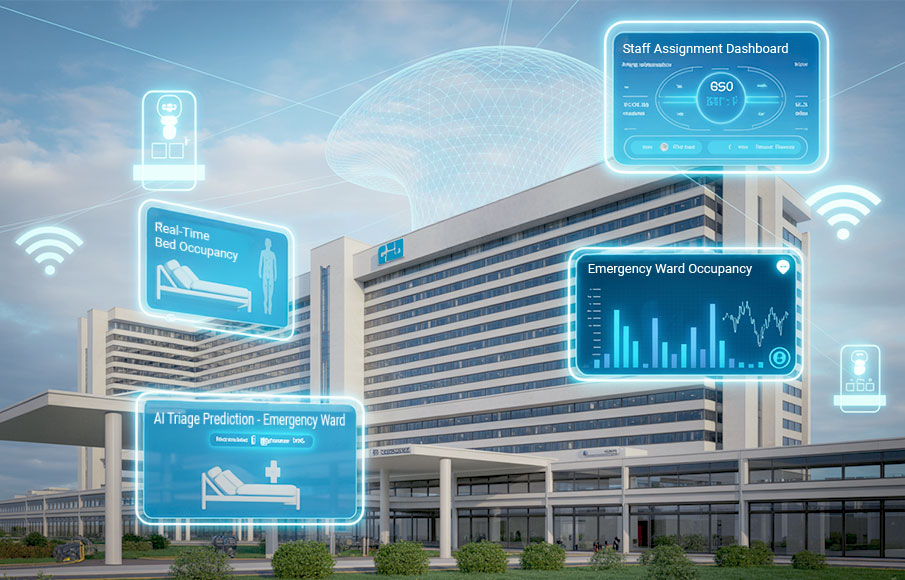Benefits of Edge Cloud Computing for Singapore Businesses
- 04 June 2024

Edge Cloud Computing is a vital technology in today’s fast-paced digital world. With a market size of USD 8.55 Billion in 2021 that’s projected to be worth USD 155.2 Billion by 2030, Singapore businesses need to start taking steps to make Edge Cloud Computing part of their digitalisation plans. Edge Cloud Computing’s strengths enable responsive analytics and real-time decision making, making it invaluable for organisations looking to optimise their operations. In this article, we cover the benefits of Edge Cloud Computing and the various industries it can benefit.
What is Edge Cloud Computing?

Edge Cloud Computing is a type of Cloud Computing that achieves greater data transfer speed and reduced latency by operating locally. It differs from traditional Cloud Computing by processing data at the edge of a network instead of a centralised data center, thus bringing the source closer to the end-user.
In essence, this means that computing resources and data storage are positioned closer to devices and sensors, which allows for more immediate data processing. By embracing this computing method, edge devices benefit from reduced latency since the data doesn’t have to travel as far to be processed. This results in faster and more efficient operations, particularly beneficial for applications that require real-time processing, such as autonomous vehicles, video analytics or smart grid control systems.
Enhanced Data Processing Speeds Benefitting Finance Retail and Healthcare

Sectors such as Finance, Retail, and Healthcare can benefit from the increased processing speeds of Edge Cloud Computing. These fields regularly utilise real-time information and video analytics for decision making and monitoring, and the high speed provided by Edge Cloud Computing helps increase efficiency and reliability.
Finance
In the finance sector, Edge Cloud Computing systems facilitate real-time fraud detection by analysing transaction data rapidly at the point of capture. This immediate processing allows financial institutions to quickly flag and stop fraudulent activities, protecting customer assets with greater effectiveness. In physical branches, banks can make use of Edge Cloud Computing’s low latency performance for video analytics to monitor their surroundings remotely and round the clock. Using CCTV footage they can detect and flag suspicious activity, keeping finance institutions secured.
Retail
Retailers are able to leverage edge computing to revolutionise customer experiences. Through ultra-responsive video analytics, stores can adapt marketing strategies in real-time, such as serving Out-of-Home advertisements based on viewers’ demographics. This adaptation can boost sales by personalising shopping experiences for each customer.
Healthcare
In healthcare, edge computing’s rapid data processing proves vital for remote patient monitoring and the use of wearable devices. By analysing health data on the spot, providers can quickly identify and respond to patient needs or emergencies. Processing data locally through Edge Cloud Computing enhances the response speed of medical information, helping empower healthcare providers in providing urgent care.
Reduced Latency for Manufacturing and Logistics

Long-distance data transmission creates latency, which is a delay in the transmission of information. For applications that require real-time or near-real-time responses, where even milliseconds matter, this is far from ideal. However, by processing data closer to the recipient, Edge Computing decreases response time significantly, achieving lower latency and allowing critical applications to receive valuable data with minimal delay.
Some industries that benefit from this are manufacturing and logistics. Low-latency real-time use cases include video analytics for inventory management, quality control, and safety monitoring.
Use Cases for Video Analytics
Inventory Management
Video analytics are highly useful for managing inventories and tracking supplies. Logistics warehouses are able to utilise these video analytics to locate and identify items based off physical dimensions, and optimise storage space. Missing inventory or misplaced inventory can be catalogued quickly, and staff can be informed, thus providing increased efficiency in this field.
Quality Control
Quality control can be achieved through the usage of video analytics to ensure that products are picked up by the correct or authorised delivery personnel, packaging or handling requirements are adhered to, and damage to products are swiftly reported.
Safety Monitoring
Video analytics are useful for plant safety in manufacturing. Cameras are able to monitor workers and detect that they’re wearing appropriate safety equipment. Accidents and unusual events can be detected and reported quickly for prompt action to minimise health risks.
The development of Edge Cloud Solutions, such as those offered by SPTel, illustrate the usage of edge computing infrastructure for swift and efficient data processing across various sectors.
Edge Cloud Computing Gives Industries Assurance of Data Sovereignty and Compliance

Data Sovereignty is a concept that many businesses are concerned with. It refers to the country of ownership that stored data must obey. In the event that an organisation’s critical data is stored overseas, it becomes beholden to the regulations of its origin country. This can create legal and privacy complications regarding usage of data, with data retention policies varying depending on country.
Edge Cloud Computing enhances data sovereignty by hosting data locally. This aspect of data handling is vital for businesses that operate under strict data protection regulations. SPTel’s Edge Cloud makes use of localised storage to ensure that data is handled within Singapore. This grants businesses:
- Data Control and Compliance: Businesses have greater control over their data, and can be assured that it always remains hosted within Singapore. This assists in adhering to compliance requirements.
- Decentralisation: Data is not concentrated in one location, making it easier to meet diverse regulatory requirements. Your data is spread out across multiple Edge Hubs around Singapore, ensuring that you don’t end up with all your critical information in one basket.
- Physical Security: Data is stored within Secure Critical Information Infrastructure (CII), providing a layer of physical data security. This enhanced security is particularly important for sensitive industries.
- Dedicated vFirewall: Dedicated vFirewalls can be deployed individually for each customer. Instead of being a shared service, customers can get customised and individually maintained digitalised security for their Edge Cloud solution.
Support for IoT and Smart City Initiatives – Why SPTel’s Edge Cloud is a Cut Above the Rest

Singapore, as a nation, is rapidly pursuing digital transformation. The end goal is to create a Smart Nation that harnesses technology to enhance multiple facets of life. Businesses such as SPTel are using Edge Cloud Computing to power this initiative. However, when it comes to selecting an Edge Cloud Service provider, end users need to look out for a partner that can deliver compute resources closest to the data source while providing reliability, high availability and flexibility, to ensure seamless operations.
To create a resilient digital environment, you need to have redundancy to ensure always-on performance. SPTel achieves this by utilising our unique access to multiple secure edge hubs across the country for Edge Cloud Computing. This means that processing can be reassigned between hubs in the event that one edge hub goes offline with backup-as-a-service capabilities. Infrastructure is also housed within secure Critical Information Infrastructure (CII) facilities for utmost physical security.
On top of that, SPTel’s many secure edge hubs are distributed across the island for computing closer to the data source, and a <1ms, ultra-low latency network, responsive computing and fast data processing is achieved. The flexible and scalable nature of Edge Cloud Computing also ensures that it can meet the changing needs of smart nations while reducing the burden on organisations to maintain and manage their own hardware. Best of all, billing is simplified without hidden data charges for more predictable monthly bills.
Finally, SPTel’s Edge Cloud solution enables cloud orchestration over public and edge clouds to enable organisations to more conveniently manage their cloud deployments to support multiple smart city applications.
Edge Computing Solutions

Edge Cloud Computing helps companies optimise operational processes without compromising on performance. This approach lessens the strain on centralised data centers and network resources, resulting in improved application responsiveness, reduced downtime risk and data sovereignty compliance. This is because Edge Cloud can bring the compute resource nearer to the use case locations. It also reduces overall IT and OT footprint, which results in less space required to house compute resources– especially for use cases such as car parks and inventory monitoring and management. This also results in reduced time and cost expenditure to service and maintain computing resources.
Edge Cloud Computing enables organisations to unlock the potential of applications such as video analytics for use cases such as inventory detection, visual inspection and large scale data analysis to improve operational efficiency.
For businesses in Singapore, leveraging a comprehensive solution like SPTel’s Edge Cloud can substantially improve efficiency of solutions like video analytics and provide enhanced user experiences. To find out more, contact SPTel today.












